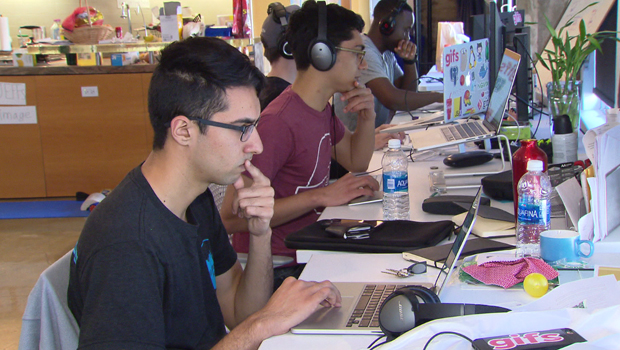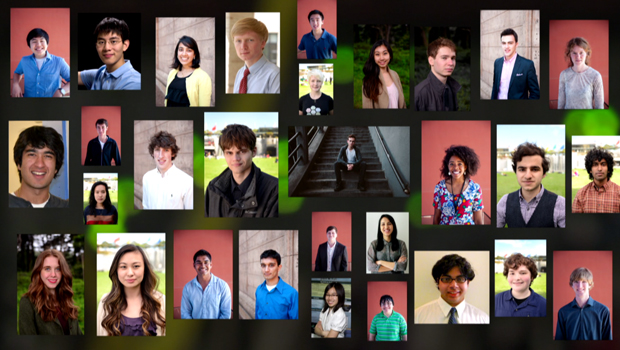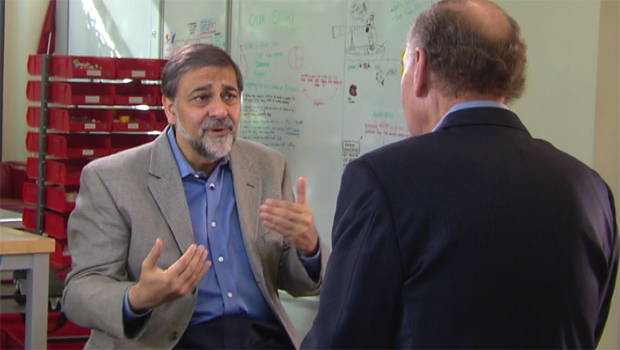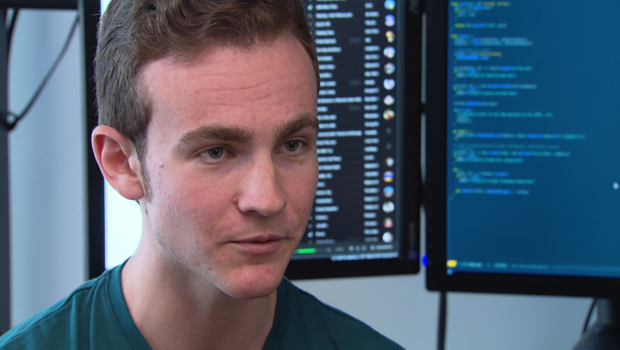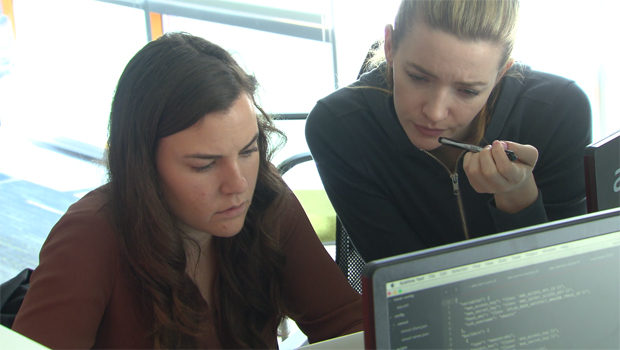Skipping school to become tech giants
A select group of whiz kids seems to be thriving despite having dropped out of college. All any of them seems to need is a high-tech idea, a sofa to sleep on ... plus a $100,000 grant. John Blackstone explains:
When brothers Kieran and Rory O'Reilly were both accepted to Harvard, their parents marked the accomplishment with new license plates: One read "2 N HRVD"; the other, "HARVRD 2."
"They might change it to '2 DROPOUTS,'" said Rory.
They both quit Harvard as undergrads two years ago. They were just 18 and 19 when they moved to San Francisco with big hopes, and almost nothing else.
"Three bags of clothes -- every day we would take it, move from hotel to hotel," said Rory.
"I remember our bank account was always negative $66, because that's the overdraft fee," said Kieran.
They're now living IN their office. "Every single day our mom tries to call us or send food," Rory said.
They've created a website, gifs.com, a tool for re-editing online videos. Seventeen million people in the past month have used it.
The O'Reillys are on a path made famous by some of the tech industry's biggest names: Jobs, Gates, Zuckerberg.
"People that drop out of Harvard, maybe the Bill Gateses of the world, the Zuckerbergs, they're the people that are really changing the entire world, in my opinion," said Rory. "And yeah, I'm glad to be a part of that."
The O'Reillys are "part of that" partly because Peter Thiel, one of the billionaire founders of PayPal, gave them $100,000 each.
Thiel started his surprising giveaway five years ago, offering $100,000 to kids who quit college to "build new things."
Jack Abraham is executive director of the Thiel Fellowship, which distributes the money to 20 new dropouts each year. And what is he encouraging? "If you have a great idea, the time to pursue it is now," Abraham said. "We also hope to show society that this is an alternate path that people can and should consider and take."
Abraham says the 105 current and former Thiel Fellows have created more than 1,000 jobs and raised $330 million from investors.
Only eight have returned to college.
- PayPal billionaire funds college-aged kids' ideas ("The Early Show," 06/01/11)
- Billionaire offers college alternative ("60 Minutes," 05/17/12)
- Dropping out: Is college worth the cost? ("60 Minutes," 05/21/12)
- Billionaire heads back to college (CBS Moneywatch, 03/13/12)
The selection committee is now sorting through 5,000 applications for this year's 20 fellowships. Most of the applicants would have much better odds getting into the Ivy League.
"It breaks my heart when some of the most promising students don't fulfill their potential because they're chasing rainbows," said Vivek Wadhwa, a fellow at Stanford University, who has been a critic of the Thiel Fellowship from the beginning."
"It's like what happens in Hollywood: You have tens of thousands of young people flocking to Hollywood thinking that they're gonna become a Brad Pitt or an Angelina Jolie; they don't," said Wadhwa.
"They don't become billionaires. There haven't been many Mark Zuckerbergs after Mark Zuckerberg achieved success."
And Wadhwa says there is little evidence the Thiel dropouts are doing much that isn't already being done in Silicon Valley."Everyone does the same thing: It's social media, it's photo sharing apps. Today it's sharing economy," Wadhwa said. "It's 'Me, too,' 'More of the same.'"
But 19-year-old Conrad Kramer and 21-year-old Ari Weinstein were convinced they had a new idea, so when they were awarded Thiel Fellowships in 2014, they both walked away from MIT to work full-time on their app, called Workflow.
"There are some opportunities that come up that you would regret turning down," Kramer said. "Workflow was definitely one of those."
"It's kind of like making your own apps that save you time," Weinstein said.
When Workflow launched, it was the number one bestseller on Apple's App Store -- and has since won several awards.
They've just hired their newest employee, Tim Hsia, a graduate of Stanford's business and law schools and an Army vet. He's 33-years-old and says he doesn't mind taking orders from a teenage boss.
"I'm learning so much because they have such a wealth of experience despite their age," Hsia said. "In Silicon Valley it's about meritocracy of ideas. And so if you have a good idea, everyone's always receptive to listen to it."
Zach Latta found many people were willing to listen -- leaving high school to move to San Francisco on his own, to start a non-profit called Hack Club.
He recalled that when he moved to the city at age 16, "I'd showed up at a gym one day with some friends, and they turned me away at the door because I had to be 18."
Now he is 18 and works full-time helping high school students learn to code.
"I feel challenged in every single day," Latta said. "And I think I'm learning as much as I've ever been while being happy."
For now these wannabe tech titans live modestly in homes they share with several others, or in offices that also provide a place to sleep. Instead of meals, some drink Soylent -- Silicon Valley's version of fast food. It apparently contains all the nutrients necessary to stay alive, in a bottle.
"Yeah -- breakfast, lunch, snack, dinner," said Latta.
They are building their companies with money from investors who seem to care little whether they graduated from college.
"It's actually kind of a badge of honor here, dropping out," said 23-year-old Stacey Ferreira. She's dropped out of NYU -- twice! The first time she saw a tweet from Richard Branson, the founder of the Virgin Group, offering to meet anyone who gave $2,000 to his charity.
She borrowed the money and met him. She was 18 and starting her first business.
"And make a long story short, he and two of his buddies ended up investing $1.2 million in our business that summer," Ferreira told Blackstone.
Two years later, she sold that company, MySocialCloud, for a hefty profit, and returned to NYU. But then she had another big idea that couldn't wait.
"If you can create your own job, why wouldn't you just do that and not get stuck paying student loans for the rest of your life?" Ferreira said.
Instead of student loans, she has $100,000 from Peter Thiel. She's working on an app called Forrge that aims to create an on-demand marketplace for hourly workers.
She's hoping that dropping out of NYU again will pay off again.
Blackstone asked, "Is there a lesson in your story for other young people?"
"Yeah, I think the biggest lesson to learn is just take risks," Ferreira said.
"What's the worst that can happen to you when you take the risk?"
"For me, the worst that can happen is I move home and sleep on my parent's couch for a couple months, until I figure it out," Ferreira replied.
For more info:
